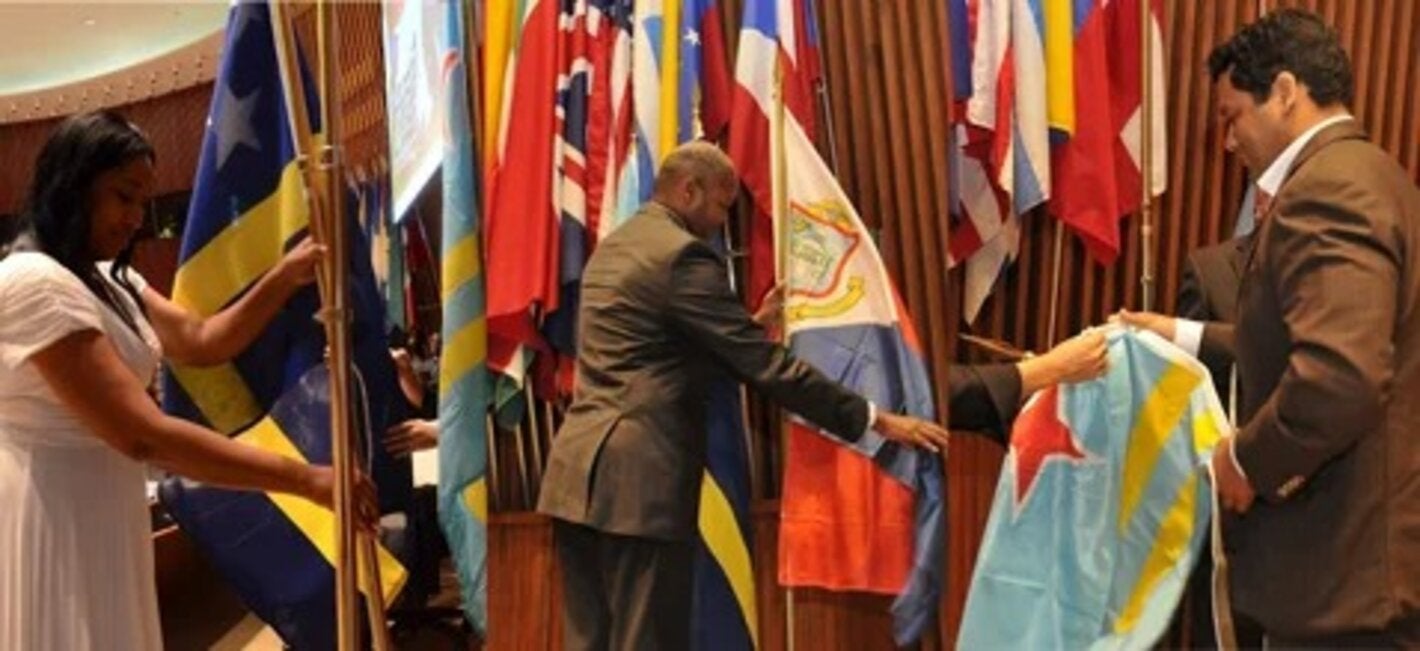
Washington, D.C., 17 September 2012 (PAHO/WHO)- Aruba, Curaçao and Sint Maarten were admitted as new Associate Members of the Pan American Health Organization (PAHO) during the 28th Pan American Sanitary Conference, which began on September 17 at the organization's headquarters in Washington, D.C.
This type of affiliation will allow the three countries to participate directly in PAHO's activities. As Associate Members of PAHO, the three States shall have the right to: participate in the meetings of their governing bodies but without the right to vote; participate with voice and vote in technical commissions or committees; access to all PAHO technical cooperation services; and receive information and documentation produced by PAHO.
"We are extremely proud that at this late stage our organization continues to grow," said Dr. Mirta Roses Periago, Director of the Pan American Health Organization.
The application for admission was submitted on August 15, 2012 by the Kingdom of the Netherlands in its capacity as a PAHO Participating State and responsible for the international relations of the three islands. Upon admission, the governments of Aruba, Curaçao, and Sint Maarten are subject to the obligations and rights set forth in PAHO standards, which include the obligation to pay a financial contribution directly to the organization.
Once these three countries were permitted to join, they were invited to place their flags along with the flags of the other PAHO members. Aruba's Minister of Health and Sports, Richard Visser, was first invited to put up his country's flag. Then the Minister of Health of Curaçao, Jacinta Scoop, also did the same with her country's flag. Finally, the Minister of Health of St. Maarten, Cornelius de Weever, was invited to put up his country's flag.
Minister Visser said that this decision represented "a new beginning for Aruba" and that the proposal arose "from the need to have a closer relationship with Caribbean countries" to address health problems that are common, such as non-communicable diseases. "This is a historic event," the minister stressed. She thanked Dr. Roses, the PAHO team, and the member countries for accepting this application for admission.
Curaçao's Minister of Health, Jacinta Scoop, also thanked the countries for the accession. The Minister of Health of Sint Maarten, Cornelius de Weever, thanked his country for its inclusion as an Associate Member and stressed that this will improve the health of his country and the region. "Thank you for the support, and I embrace this new role to improve people's public health and widen the circle," he said.
In October 2010, following a constitutional reform process, the Netherlands Antilles ceased to exist as a country within the Kingdom of the Netherlands and since that date, the Kingdom has four countries: the Netherlands (including the islands of Bonaire, Sint Eustatius and Saba), Aruba, Curaçao and Sint Maarten. Although the Kingdom of the Netherlands has been represented in PAHO as a Participating State since 1951, which includes its countries in the Americas, the countries of Aruba, Curacao and Sint Maarten requested that each request Associate Member status.
This category was established in 1992 for the admission of "a territory or groups of territories in the region whose international relations are the responsibility of States whose seat of government is in or outside the Region". Puerto Rico is PAHO's other Associate Member, and this year marks the 20th anniversary of its incorporation into the organization.
Puerto Rico's delegate to PAHO, Raul Castellanos, said that with the entry of Aruba, Curaçao and St. Maarten as new PAHO Associate Members, "Pan-Americanism is expanding and reinforced, and becoming a real practice."
The Kingdom of the Netherlands became a PAHO Participating State in 1951, representing member countries of the Americas at that time (Netherlands Antilles and Aruba). That year, France and the United Kingdom also joined as Participating States through their territories in the Americas.
PAHO's Constitution states that territories or groups of territories within the Americas that do not have their own international relations have "the right to be represented in the organization."
This year, PAHO celebrates its 110th anniversary and is the oldest public health organization in the world. It works with all countries in the Americas to improve the health and quality of life of people in the Americas and serves as the WHO Regional Office for the Americas.



